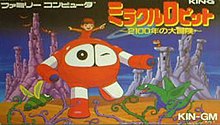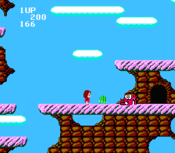Miracle Ropitt: 2100-Nen no Daibōken
Appearance
| Miracle Ropitt: 2100-Nen no Daibōken | |
|---|---|
 Cover art | |
| Developer(s) | Micronics[1] |
| Publisher(s) | King Records[1] |
| Composer(s) | Michio Fujisawa[2] Yasunori Shiono[2] |
| Platform(s) | Family Computer |
| Release | |
| Genre(s) | Action[1] |
| Mode(s) | Single-player Two-player |
Miracle Ropitt: 2100-Nen no Daibōken[a], also called Miracle Ropit's Adventure in 2100 on its title screen, is a Family Computer video game that was released in 1987 exclusively for the Japanese market.[3] The Adventures of Star Saver, also known as Rubble Saver is a related quasi-sequel for Game Boy.
Summary
[edit]
The game must be played through twice in order to see the true ending, just like in Ghosts 'n Goblins.
A girl in the year 2100 uses a robot suit. If the player is hit once, then the suit is lost and the player must play as the little girl.[4] One more hit and the player loses a life.[4] Although the game was only released in Japan, the game's text is in English and is completely playable by English speakers.
Notes
[edit]References
[edit]- ^ a b c d "Release information". GameFAQs. Retrieved 2011-05-20.
- ^ a b "Composer information". VGMDB. Retrieved 2011-06-06.
- ^ "English-Japanese title information". SuperFamicom.org. Retrieved 2011-05-20.
- ^ a b "Basic overview (in pictures)". Video Games Museum. Retrieved 2011-05-20.
